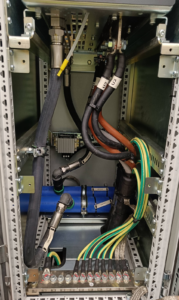
🔍 Health Assessment for Electric Motors: The exercise electrocardiogram!
🔍 Health Assessment for Electric Motors: The exercise electrocardiogram! Have you ever been curious about how to evaluate the health of your electric motor systems
The training programs of ORBITS focusses on a thorough transition of knowledge in the first place. We teach on a broad range of topics related to both electrical and mechanical engineering with a special focus on condition monitoring, Root Cause Failure Analysis (RCFA), Failure Mode Effect and Criticality Analysis (FMECA), Electrical Signature Analysis (ESA/MCSA) and vibration analysis.
Our standardized courses on ESA/MCSA and vibration analysis are adaptable for a wide range of audience background with small tuning of the learning goals. All courses include a slidebook and digital slides/animations. Contact us for internal company trainings or take a look at our calendar for upcoming public events!
This training program is designed to provide a thorough understanding of electric machines, encompassing their operation, types, failure modes, and diagnostic methods. It is divided into three levels, beginning with foundational concepts and progressing to advanced techniques. Participants will gain comprehensive knowledge about these essential industrial components, with practical case studies integrated to enhance their learning experience. Upon completion of the program, attendees will be well-equipped to identify and address common machine problems based on electrical measurements, making them valuable assets in the industry.
You might have heard about the relationship between bearing currents and electromagnetic interference, but you’re still unsure about how to approach this. It’s understandable because this is a highly complex subject. This complexity arises from various factors: it involves intricate physics, there are different levels of bearing currents, and numerous solution providers exist in the market. However, it doesn’t have to be daunting, especially since you don’t need to fully grasp the problem in intricate detail, let alone describe it mathematically, to choose an effective solution. In this one-day training program, the problem is presented in a straightforward manner, and proactive solutions are offered to enhance the reliability of your machinery.
Following a general introduction to the functioning of electric machines and frequency drives, we delve into the origins of bearing currents and stray currents in detail. This is explained pragmatically and visually. Potential consequences and risks are also discussed. Afterward, we explore the detection and measurement of stray currents with a focus on practical tools. Subsequently, various potential solutions are explored. The day concludes with illustrative case studies.
This training program is tailored to maintenance technicians who frequently encounter the effects of bearing and stray currents and wish to gain a deeper understanding of the issue to prevent future failures. The instructor possesses a strong theoretical background and can provide clear practical interpretations based on extensive experience and numerous real-life cases.
Rotating machines, the driving forces of our current process industry. Despite these machines are often being built in a simple and robust manner, unexpected breakdowns frequently occur. This often results in significant collateral damage and an impact on downtime, loss of product, and delivery delays.
Understanding machines, their operation, and their failure modes is crucial in effectively detecting failure patterns and avoiding unexpected breakdowns. This training aims to acquire technical insights about machine problems, how they behave, and how they can be detected. A particular emphasis is put upon vibration analysis and stator current analysis (MCSA/ESA).
We assess the market offering of condition monitoring systems against the needs of the machines, so that the student can aim for an optimal cost/benefit analysis for their assets.
This training consists 29 bite-sized chapters, each lasting 4 hours, divided over 3 modules. It can be provided as a full course or on-demand

🔍 Health Assessment for Electric Motors: The exercise electrocardiogram! Have you ever been curious about how to evaluate the health of your electric motor systems

Traditional Grounding Techniques Fail our Electric Motors! Common practice among electricians suggests that grounding should be approached similarly to protective earth (PE) connections, typically involving

Who is MADI? MADI is not a person; it’s a buffet, perfectly aligned with your New Year’s resolutions.It’s a training buffet. MADI stands for Machinery
This website only uses essentiel cookies to ensure you get the best experience on our website.
To complete the subscription process, please click the link in the email we just sent you. If you can not find your confirmation email in your normal inbox, it is worth checking in your spam or junk mail section.
To complete the subscription process, please click the link in the email we just sent you. If you can not find your confirmation email in your normal inbox, it is worth checking in your spam or junk mail section.